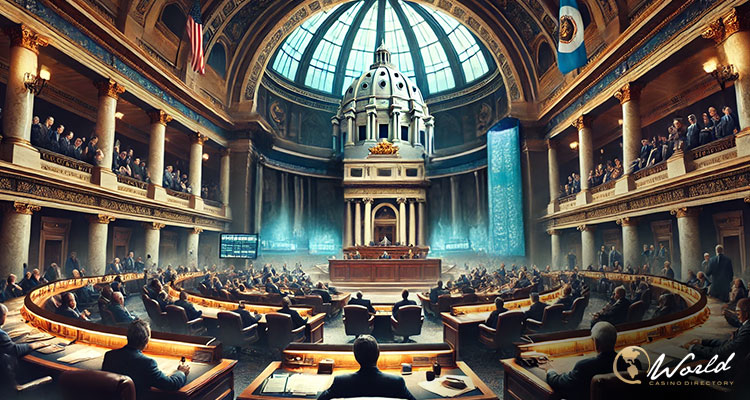Minnesota’s lawmakers are once again aiming to legalize sports betting, a long-debated issue in the state. This time, proponents are hopeful that the bill will pass during the current legislative session, but challenges remain. While some see 2025 as the year for success, others point to political gridlock and internal disputes as major obstacles.
The drive for sports betting in Minnesota:
Sports betting has already been legalized in 38 states and the District of Columbia, but Minnesota has yet to join them. The state continues to miss out on the vast revenues generated by the growing $23 billion Super Bowl betting market this year, a sum that will not include legal wagers from Minnesota residents. Despite this, lawmakers are making another attempt to change that.
Senator Jeremy Miller, a Republican and co-President of the Minnesota Senate, is one of the most vocal supporters of sports betting. “I really do believe this is the year a sports betting bill could pass the Minnesota legislature,” Miller stated, as reported by CBS Minnesota. He believes that legalizing sports betting could generate up to $80 million in tax revenue for the state. Miller’s proposal also includes allocating 50% of this revenue to support charitable gambling, such as pull tabs, 25% to attract major events to Minnesota, and 20% to aid the horse racing industry.
Another bill, introduced by Democratic-Farmer-Labor (DFL) Senator Matt Klein, aims to bring a similar framework to Minnesota but with a few key differences. Like Miller’s, Klein’s bill would give Minnesota’s 11 Native American tribes the authority to issue sports gambling licenses. However, Klein’s legislation offers tribes more control, with the option to partner with major sports betting platforms like DraftKings.
Klein explained, “There are 11 tribes. Each tribe can get one license now, then if they choose to start a contract with a platform such as Draft Kings or one of the others they can do that.”
One of the most significant hurdles in this debate is the relationship between the state and the tribes. Minnesota’s 11 tribes were granted exclusive rights to gaming under a 1991 agreement, and some tribal leaders are concerned that sports betting might encroach on their sovereignty.
Klein’s bill outlines a system in which each of the 11 tribes could apply for an online sports betting license, but only one license would be available to each tribe. The bill also proposes a 22% tax on net revenue from bets placed off tribal land, a tax rate higher than what most gaming operators are comfortable with. This could potentially trigger tensions with tribal nations, many of whom want to preserve their exclusive rights to gaming activities without state intervention.
Klein’s bill does aim to address some concerns from the horse racing community, proposing that 15% of sports betting tax revenue be set aside to support the racing industry. However, it remains to be seen if this will be a satisfactory solution for the state’s racetracks.
Both Miller’s and Klein’s bills offer detailed frameworks for the distribution of sports betting revenues. Under Klein’s SB 757, tax revenue from sports betting would be allocated in a variety of ways: 45% would go toward tax relief for charitable gaming, 15% to the Racing Economic Development Fund, and 10% to bring major sports events to the state. Another 10% would be earmarked for human services, and 5% would go to support youth sports programs.
The bill also outlines strict regulations for the sports betting market. It would prohibit certain types of bets, such as insurance contracts on an athlete’s life or private social bets, and it would impose restrictions on advertising, including a ban on ads targeted at those under 21. Operators would be required to implement responsible gambling tools, including bet- and time-limiting options.
For daily fantasy sports (DFS), the bill establishes a framework for its regulation and licensing, allowing tribes to partner with DFS operators. The revenue from DFS would also be subject to a tax rate of 15% on adjusted gross receipts, with the revenue distribution mirroring that of sports betting.
Political gridlock and delays:
Despite these efforts, the road to passing a sports betting bill remains uncertain. The Minnesota House is currently embroiled in a political standoff, with the DFL party boycotting legislative sessions. The boycott, which has entered its fourth week, is causing significant delays in the legislative process, and both sides continue to receive paychecks without a clear resolution in sight.
Senator Miller expressed hope that the legislature would overcome its internal issues, saying, “I am hoping they can get it together so we can get the work done for the people of Minnesota.”
While both Miller and Klein advocate for the legalization of sports betting, their bills differ in some key aspects. Miller’s proposal, which has yet to be formally filed, would impose a 20% tax rate on online sports betting revenue, slightly lower than the 22% proposed in Klein’s bill. Miller’s bill would allocate 50% of tax revenue for charitable gaming tax relief, 25% for bringing major sporting events to Minnesota, and 20% to the Minnesota Racing Commission, which would benefit from the funding directed to horse racing.
However, the tribes’ concerns about sovereignty and tax rates could complicate the passage of both bills. The tribes’ push for control over gambling operations, combined with the ongoing power struggle in the House, makes it unclear when, or if, sports betting will be legalized in Minnesota.


